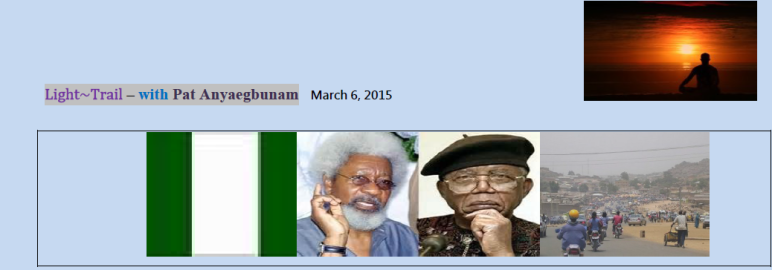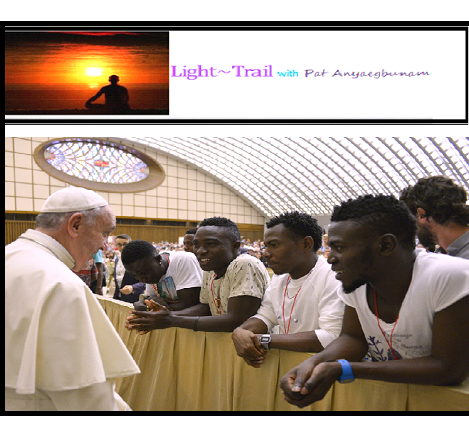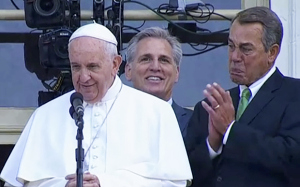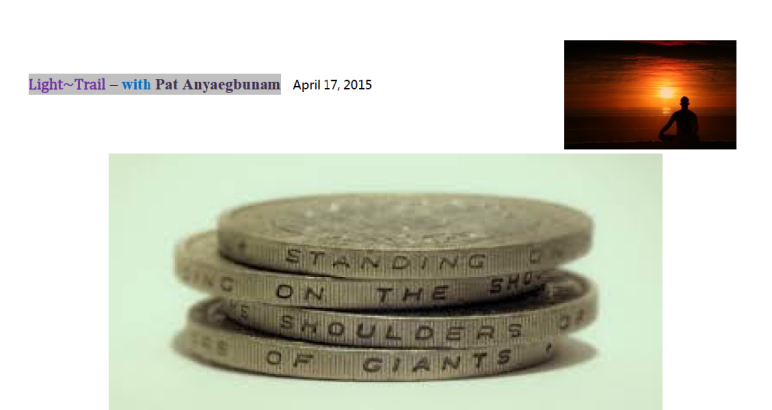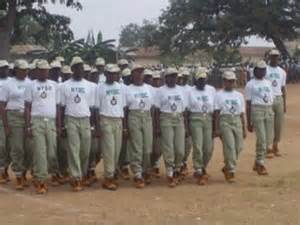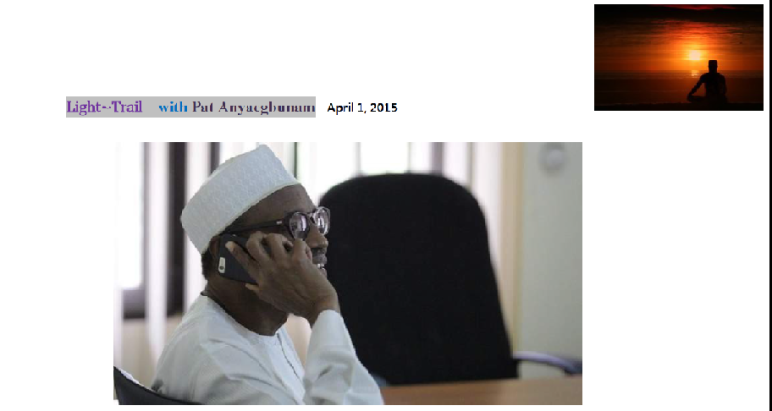Greatness or nothing
Nationhood and greatness…! At 55, these words constitute the national language every Nigerian public officer needs to learn to speak fluently. This language is all about raising the expectation bar across all platforms of Nigeria’s governance oversight – finance, infrastructure, natural resources, global appeal, security, citizenship, etc. This is about creating and executing a coordinated ground game that makes the country’s largely untapped potential absolutely worthy of full exploration. Particularly, every member of Buhari’s team ought to speak this national language effortlessly – in words and in deeds – or Nigeria’s ship of state will be condemned to a tempestuous journey against the current of steady growth and development. There is hardly any good reason for nationhood if greatness is not the foundation of the union.

While the administration must steadily ramp up speed on the mission of wrestling back Nigeria’s independence from negative forces mostly within, there is one core reason even ordinarily nonchalant citizens must sit up, tune in and begin to take note; to avoid stumbling into the familiar waters of bad history. For all intents and purposes, history holds that Nigeria has mostly been on a pretty convoluted journey in the wilderness of a splintered sense of both self and mission. And we know, still from history, that this voyage may have been rendered mission-impossible by the overarching ubiquity of a woefully flawed leadership operating system (OS). Can you imagine a contaminated OS as the backdrop for your active computer network?
Think of these when you think of what Nigeria’s leadership team must now dump in the thrash site of botched methods in order to begin to right the cumulative wrong of Nigeria’s flawed leadership culture. Think of the percentage of governance institutions and key operatives at all levels that seem at best to have mostly perfected the art of making a caricature of best governance practices, for one thing. Think of year after year of official expenditures and pronouncements against high profile criminality, with laughably few culprits ever found guilty even as high places reek toxically of the poison. Think of what dreams could have come true were the story to have been a little less convoluted. Have you not heard subsequent Nigerian administrations lament past corruption only to deck the halls and celebrate personalities who clearly presided over all the ills they so eloquently condemn?
Think perhaps of blessings remolded as devastating weapons used by the profligate few to impoverish the countless blessed. Think about the extent to which the art of leadership in Nigeria episodically races to the bottom in a costly game of who is able to get away with the most loot, having done the least for the people. Think of what has been serially stolen from the lives of millions of citizens by too many of the men and women they trusted to make a difference. Think of a nation getting functionally poorer as its handlers are steadily getting richer. Can you see how a culture of mercenary stewardship has repeatedly confiscated so much goodness and mostly returned ghastly uninspiring results? Do you see why Nigeria’s fully realized independence is still a desire with no target date in sight? No deep house cleaning is achievable without getting down to root-cause levels? To rise to enviable heights and claim its full independence, Nigeria must first stoop and conquer its deep-seated leadership demons.

President Buhari may only have alluded to this in his independence address, but it is clear that Nigeria’s cumulative leadership scorecard is poor. Really poor and needing some urgent blood transfusion! As we reflect on Nigeria’s 55th independence anniversary, even the unrelentingly charitable still acknowledge that the nation’s body of accomplishments bears ample historic evidence of criminally culpable bad parenting. While for too many, public office in Nigeria has so far been a guaranteed platform for runaway personal financial success, there is still no subtleness around the fact that in the reality of what most Nigerians live today, there remains trifle to be joyous about, and pretty little to celebrate. Come rain or shine, Nigerians celebrate nonetheless. This is good.
To be optimistic and celebrate life even in the face of intimidating odds is a good thing; at least up to a point. Eventually, odds must be confronted even if to test their seeming invulnerability. What Nigerians must now cease to celebrate, if the march to greatness is to really resurge from the grassroots to the power floors, is the culture of religiously unquestioning tolerance for run-of-the-mill outcomes. Same goes with the tacit respect for unaccountable and largely irresponsible leadership. Nationhood and collective greatness must now come first in Nigeria or the music will remain that of lost opportunity. So far, unearned reverence directed at bad leaders with lots of cash clout and little exportable credibility has served Nigeria only as well as a bad prescription for a very serious ailment.
Essentially, nationhood and greatness constitute the same signature language that powers every focused nation’s ambitions. It is the language Narendra Modi was promoting in India recently, complete with savvy sartorial diplomacy, as he hosted President Buhari and 39 other African leaders, including South Africa’s Jacob Zuma and Zimbabwe’s Robert Mugabe. Just as the 3rd India-Africa Summit in New Delhi was about showing Africa and the world what makes Modi’s India tick, what makes Buhari’s Nigeria tick must also be packaged and presented to the world with that come-check-us-out craftsmanship and confidence that makes for bankable national clout.

Growing and substantiating Nigeria’s national worth
To the extent that Buhari’s leadership will make a lasting difference for Nigeria, his language of governance must project outward from the ‘nationhood and greatness’ premise. The measure of relevance of this new deal must then be anchored on essential sector performance metrics that will form the pillars of Nigeria’s appreciating value. This should apply to the agriculture portfolio as it does to the petroleum sector, and it should compel performance in the defense ministry as it does in education. No unit of Nigeria’s governance pillars should be left to just coast along or serve as a leakage point.
While there is good reason to believe that President Buhari gets the need to repackage and re-present a Nigeria that is seriously worth exploring by the rest of the world, there continues to be need for robust messaging on Nigeria. The current default messaging backdrop of corruption, Boko Haram and being broke, does not and should define a richly blessed nation of very industrious and optimistic people. What is the good news in the education or health sector? Who is marketing Nigeria on this front? What of tourism and investment? The focus should be on a recycling avalanche of concrete action, credible results and positive messaging. Nations are not seen as strong until their news headlines begin to sound good; and a nation’s news headlines only begin to sound sustainably good if good things are happening on several fronts.
How does news on Nigeria begin to sound good on a more holistic and sustained basis? First, the administration should get great at communicating what makes Nigeria compelling. This needs to be done loudly and clearly. The administration should then communicate what great things it plans to do with the country’s potential across the entire landscape – agriculture, security, petroleum, infrastructure, defense, education.., everything. Just as important, it must keep communicating what it has done already, and what else it is doing to make the system even more compelling. Finally, the team must keep communicating and celebrating key milestones – the dividend of leadership. What is celebrated must of course speak substance, not empty rhetoric. For instance, if two million more people now have access to good healthcare at home rather than have go to India or South Africa for medical care, that is great news a health minister should be proud to take to the president, the people and the world. If it is truly the case that a particular sector’s leadership has made a verifiable difference, it’s important to tell the world that good things are happening. If on the other hand a particular captain’s tenure is all about ‘no news is good news,’ this should be ground for a change of guard. A strong stewardship showing hits home to the people. This is how a smart leadership builds up a followership of informed and intelligent cheerleaders. In the absence of this, leadership becomes a charade, and corruption becomes its sure outcome.

No such thing as a hero unsung
Since people and businesses (local and international) will happily follow a leadership as soon as they can clearly see that doing so is bound to get them to where they want to go (not necessarily where the leadership itself wants to go), you can never over-communicate the mission, the rules of engagement, what is in it for the audience, and what value you are delivering. Here, there is no such thing as an unsung hero; heroism is itself the song. On the contrary, it remains an awfully bad strategy to keep people guessing or to keep lamenting on what is wrong and why you are not delivering. As long as an entity – company, community or country – is operating below its promise, there is often only one thing wrong; leadership.
Incidentally, when the trouble is with leadership, it is only a radical shift in the leadership mindset that can right the wrong. All in all, to substantiate national worth, there has to be much to show in concrete terms and less to explain away by way of awkward apologies and recurring throw backs to the past. Not only will the ‘talk and walk’ of Buhari’s leadership team hand the global market the metrics with which to compute Nigeria’s national worth and brand Nigeria on the international scale of ‘who is who’, it will also give investment capital actionable insight into what the nation is and is becoming; the signal to get involved or to run for cover.
Nothing challenged, nothing changed
The starting point of enhancing national worth is of course full scoping and transparency. By this we mean that every Nigerian governance space and underlying statistics should be public property. If leadership performance stats stay in the public domain, they will keep being challenged, no doubt. And if results are constantly challenged, they will keep getting better. This is the beauty of democracy; it can be messy for sure, but if it stays in the open, it often gets better for being challenged. Remember the ‘good, better, best’ idea? You never let it rest until your good becomes your better, and your better becomes your best.

Here are a few pointers to what the leadership of increasing national worth amounts to. In summary, it is the challenge for value and growth inherent in asking questions. You can certainly form your own questions from any angle of Nigeria’s social or economic landscape:
- Who is Boko Haram and what motivates this group? How many Nigerians have been slaughtered by this group in the last few months, and how is the government winning this very traumatizing battle? There should be cohesive national answers to these questions. This is as good for education as it is for national security.
- How many Nigerians anxiously head overseas each year for medical treatment? How much does this cost in foreign exchange demand, and how are things getting better today on this front? These questions are as good for national planning as they are for foreign exchange management.
- How often today does a Nigerian pay more than the official fee for the national passport, for import duty, or for some other government service? What is happening today to change things for the better?
- How many Nigerians spend countless hours on the road just to travel from Lagos to Onitsha, or from any other point A to point B? Why should the issue of dangerously bad roads remain such a gaping resource drain after so much money has left the federal coffers in its name? What government plan is in place now to change this in the next several months?
- Why are basic services such as air-conditioning and clean bathrooms such an intractable challenge for the nation’s airports? What is locally useful about this Local Government office? What operatives are still getting paid in spite of these obvious fidelity and competence gaps?
These are questions that need to become central to the Buhari strategy. They are today’s powerful questions for Nigeria’s stewardship re-orientation. More importantly, these are urgent leadership questions that need to be asked and explored now. Nigeria’s best future lies in what its leadership does well with such questions in the here and now; not tomorrow and not the year after. Indeed, Nigeria’s future is now.
Heights begging to be climbed
From the Rivers/Anambra axis to the Katsina/Jigawa fronts, and from the Yobe/Adamawa corridors to the Lagos/Kwara flanks, Nigerians need to begin to see their country’s pillars of greatness going up without the familiar ‘one step up, two steps down’ dance of drunken indifference. Think about this! Just between the Babangida and Jonathan years, a countless number of Nigerians have grown into adulthood without feeling any single vibe of Nigeria’s potential greatness. Not from national infrastructure that is getting better, not from sustained innovation and transparency in national wealth management, and certainly not from ‘great lofty heights attained’ in healthcare, political leadership, education, security or what have you. Little wonder that Nigerians are hungry for a nation where the dominant stories are no longer revolving perennially around what could have been and ‘who took the cookie from the cookie jar?’
Nigerians want to return to national conversations that are intelligently structured around heights to be attained through great service and innovation. As they thirst for cashable leadership commitment as the key value promise of every public office, they can’t wait to be rid of the culture of depraved pursuit of self interest in public office, too often bordering on blatant disregard for life, God and country. While the former is the open secret to boosting both employment and foreign investments flow to a country, the latter could be seen as the perfect recipe for national worth self sabotage. Painting this picture in practical terms would perhaps give a more familiar flavor to what is at stake here. For instance, if a country has the best holiday resorts but is also reputed for poor work ethics, further complicated by uncomplimentary transportation and security standards, tourism dollars will be shy to visit. And if the underpinnings of its healthcare and education systems are weak, citizens’ demand for foreign exchange to be used to fund hospitals and schools abroad will be high. Either way, confidence vote is outward rather than inward, and the first to head abroad are often the leaders delivering bad returns to the people. And where confidence goes, so goes resource flow! As is thus apparent, national greatness is not a nebulous quantity to be sung and danced just in anthems and matras; it must crystallize and translate into tangible assets that are actively boosting overall quality of life and attracting asset multipliers.
National greatness must also translate into a growth mindset in which what is rewarded is honest and uncommon effort rather than personal relationships. In other words, rather than give the coveted job to your relative or friend just on account of this fact alone, give it to the person you know will outwork these people. This is how you embed pride and substance into leadership outcomes, growing the nation’s wealth as you do so. And this is how assets, systems and informed leaderships must perpetually work together in order to ruggedly promote liberty and the pursuit of worthy goals, safeguard lives and property, and boost national worth. The hope is of course that Buhari’s ministers, whenever they ease into their specific portfolios, are charged with going for value in this clear and concise way. Even the thought of this alone is exciting.
The road ahead
If we agree that “great lofty heights” summarizes Nigeria’s ambitions and that these ambitions mean as much in Akwa Ibom as they do in Sokoto, perhaps we can also agree that time is indeed of the essence. It is thus time to launch upward with some sustained traction. The agreement here is about a reality check so Nigeria’s tomorrows are not mere regurgitations of its past. This paradigm shift is vital since Nigeria’s march to where it had boldly professed to be going every time the band has rallied has so far substantially been a turbulent march around insubstantial heights? Course correction would seem to be the reason President Buhari is big on taking another look at processes and methods. As part of this re-launch plan, he must also seek to dismantle sacred temples of corrupting influences? The hope is that he succeeds, for the sake of so many.
Although Nigeria remains the poster child for a gifted child let down by severe parental dysfunction, having turned 55, the story is no longer one of infancy. For one thing, Nigerians do not need for their leaders to continue to be their ‘ogas’ in high offices. Nigeria is sure to get nowhere great with know-it-all bosses in expensive gears, travelling through town with village-size entourages. Even when these folks travel in bullet-proof jeeps shooting through space and time at movie-style speed, they still travel on fast-lanes of chaos as long as citizens remain victims of their bad choices. Growing pains must now give way to the clarity of purpose generally ascribed to informed adulthood. Nigerians need less of entitled and hands-off bosses and more of engaged Process Excellence Officers travelling the same lanes as their people, leading effective teams, and actively championing best-practice teamwork. Yes Nigerians need result oriented leaders with a strong sense of mission; leaders who see and treat their benefactors as an adult population of intelligent people. We want to believe that Buhari understands this need too. “Let us remind ourselves of the gifts God has given us,” encouraged the president in his Independence Day address.
And so Nigerians must stand reminded.

Of gifts, indeed Nigeria has plenty. There is the gift of people; the gift of being the seventh most populous country on planet earth? There is also the gift of being the proud land of plentiful supply of oil and gas. How about swats of other priceless endowments, from solid minerals to water resources? Those too! Can you see why getting the Nigerian social and economic engine to hum is a leadership thing? Do you see that this will take uncommon commitment from a team that really seeks to do it right? Rebuilding a fallen house, as is arguably recommended in the case of the Nigerian house, is not a cosmetic affair; some deep digging is warranted so the pillars of shared proprietary interest and institutional integrity can firmly secure the structure on all fronts.
Reinventing Nigeria’s purpose-deprived unity
At 55, Nigeria needs to retire the infant muscles it has so far deployed haphazardly for fighting the giant realities that need to be wrestled down as it seeks to grow and prosper as an independent and emerging nation of consequence. Low national ambitions, fixed leadership mindsets, high corruption tolerance, disempowered citizens, and lack of institutional independence are just a few of the telling signs of prolonged infancy. Just as with former President Olusegun Obasanjo’s political prisoner-to-presidency second act, President Buhari’s second coming presents another unique opportunity to pause and think hard and smart about how best to get Nigeria marching consistently in the direction of its Promised Land? In one of the most informative highlights of his Independent Day address, President Buhari aptly regretted that “We are not there yet because the one commodity we have been unable to exploit to the fullest is unity of purpose.”
Unity of purpose! What a brilliant idea! On what should Nigerians unite once and for all? What is the rallying purpose that is at once weighty and agile enough to serve as the vehicle for fast-tracking the Nigerian racehorse to where it really needs to be? Let us go back to the ‘nationhood and greatness’ mission. To get Nigeria there, President Buhari’s challenge, which is really Nigeria’s independence challenge, can be repurposed to fit into the below short to-do list:
- Elevate the national brand above the stranglehold of elite-financing process corruption.
- Elevate the operating service expectation above the current state of socially accepted mediocrity.
- Raise the expected return on every level of leadership and curb the excesses of public office.
- Call criminality in leadership what it is and fight it with rule of law rather than with fleeting words.
- Rally Nigeria’s tremendous potential around a singular national identity – process excellence.
- Stop feeding the currently thriving socio-ethnic silos of tunnel-visions and hostilities.
- Make Nigeria attractive to foreign capital, from schools to hospitals, and from security to the overall ease of doing business.
If President Buhari can make some respectable dents on the seven fronts above before Nigeria’s 56th independence anniversary, there would be much cashable dividend for citizens to celebrate, and much fewer worthless IOUs to saddle the people with. He would thus have unshackled Nigeria and Nigerians from the post independence homemade chains of recycling poor showing.

